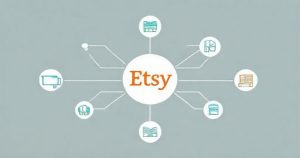In the dynamic world of e-commerce, Etsy sellers continuously seek innovative ways to enhance their operational efficiency and expand their market reach. The strategic implementation of Etsy integrations serves as a cornerstone for achieving these objectives. These powerful tools connect your Etsy shop with various third-party applications, automating routine tasks and providing deeper insights into your business performance. Understanding the scope and benefits of these integrations is crucial for any seller aiming to optimize their workflow and foster sustainable growth.
Understanding Etsy Integrations for Enhanced E-commerce
Etsy integrations refer to the process of linking your Etsy store with external software, applications, or platforms designed to streamline specific business functions. This connectivity allows for automated data exchange, reducing manual effort and minimizing errors. From managing inventory across multiple channels to simplifying shipping logistics, these third-party Etsy apps are vital for modern Etsy store management. They transform a complex set of tasks into a cohesive and efficient operation, enabling sellers to focus more on creativity and customer engagement.
1. Streamlining Inventory and Order Management on Etsy
Effective inventory control is paramount for any successful Etsy shop. Integrations specifically designed for inventory management Etsy allow sellers to synchronize stock levels across their Etsy store and other sales channels. This automation prevents overselling, updates product quantities in real-time, and provides a centralized view of all available items. Furthermore, order management integrations consolidate incoming orders from various platforms into a single dashboard, simplifying the processing, tracking, and fulfillment stages.
These sophisticated Etsy seller tools automate tasks such as inventory updates, low-stock alerts, and even product listing synchronization. For sellers with a large catalog or those operating across multiple platforms, these integrations significantly reduce the time spent on administrative tasks. The accuracy provided by automated inventory management helps maintain customer satisfaction and prevents potential issues related to stock discrepancies. This efficiency is a core aspect of Etsy shop optimization.
2. Automated Shipping Solutions for Etsy Shops
Shipping can be one of the most time-consuming aspects of running an Etsy business, but powerful shipping solutions Etsy integrations simplify the entire process. These tools connect your shop directly to major shipping carriers, allowing for automated label generation, rate comparisons, and tracking updates. Sellers can effortlessly print shipping labels, schedule pickups, and send tracking information to customers without leaving their integrated platform. This automation not only saves valuable time but also often results in reduced shipping costs.
By integrating with shipping platforms, Etsy sellers gain access to a wider range of shipping options and discounted rates, which can be passed on to customers or contribute to higher profit margins. The seamless flow of order data from Etsy to the shipping application ensures accuracy and reduces the likelihood of errors in addresses or package details. This streamlined process is essential for maintaining prompt delivery times and fostering positive customer experiences, thereby boosting overall Etsy store management.
3. Financial Tracking and Accounting Integrations for Etsy Sellers
Accurate financial record-keeping is critical for compliance and strategic business planning. Etsy accounting integrations bridge the gap between your sales data and dedicated accounting software. These tools automatically import sales transactions, fees, and expenses from your Etsy shop, categorizing them for easy reconciliation. This eliminates the need for manual data entry, significantly reducing the potential for human error and saving countless hours during tax season.
Such integrations provide clear insights into your business’s financial health, offering detailed reports on revenue, costs, and profitability. Sellers can track their income and expenses with precision, making informed decisions about pricing, investments, and overall business strategy. Connecting your Etsy shop with robust accounting platforms ensures that all financial data is organized and accessible, facilitating smoother tax preparation and a comprehensive understanding of your e-commerce integration Etsy performance.
4. Enhancing Product Creation with Print-on-Demand Integrations
For many Etsy sellers, especially those specializing in customized or unique designs, print-on-demand Etsy integrations offer a revolutionary approach to product creation and fulfillment. These integrations allow sellers to design products without holding physical inventory. When a customer places an order, the integration automatically sends the design and order details to a print-on-demand partner, which then produces and ships the item directly to the customer.
This model significantly reduces upfront investment in inventory and eliminates the need for managing manufacturing or shipping logistics. It empowers sellers to offer a vast array of products, from apparel to home decor, with minimal risk. Print-on-demand integrations streamline the entire process from design to delivery, making it an excellent option for expanding product lines and exploring new niches within the Etsy marketplace without increasing operational complexity. This is a prime example of effective Etsy automation.
5. Leveraging Marketing and Customer Relationship Management Tools
Building strong customer relationships and executing effective marketing campaigns are vital for long-term Etsy business growth. Integrations with CRM for Etsy sellers and marketing platforms enable automated email sequences, targeted advertising, and streamlined social media management. These tools allow sellers to segment their customer base, send personalized messages, and track the effectiveness of their marketing efforts, all while complying with platform policies.
By connecting your Etsy shop with robust marketing automation tools, you can nurture leads, encourage repeat purchases, and gather valuable customer feedback. This systematic approach to customer engagement helps build brand loyalty and increases the lifetime value of each customer. Such Etsy marketing tools are indispensable for any seller looking to expand their brand presence and optimize their customer communication strategy, contributing significantly to Etsy shop optimization efforts.
6. Cross-Platform Selling: Integrating Etsy with Other Marketplaces
Diversifying sales channels is a strategic move for many e-commerce businesses, and cross-platform selling Etsy integrations facilitate this expansion seamlessly. These integrations allow sellers to manage their product listings, inventory, and orders across multiple marketplaces or their own independent websites, all from a centralized system. This capability ensures consistency in product information and pricing, preventing discrepancies that can arise from manual updates on various platforms.
By leveraging tools that support e-commerce integration Etsy across different platforms, sellers can tap into new customer bases and reduce their reliance on a single marketplace. This approach not only boosts sales potential but also offers greater resilience against market fluctuations. Managing multiple storefronts becomes more efficient and less prone to errors, making cross-platform selling a viable and powerful strategy for comprehensive Etsy business growth.
Maximizing Your Etsy Business Through Strategic Integrations
The strategic adoption of Etsy integrations is not merely about convenience; it is about building a scalable, efficient, and resilient e-commerce business. By carefully selecting and implementing the right third-party Etsy apps, sellers can automate repetitive tasks, reduce operational costs, and gain profound insights into their performance. These Etsy seller tools empower entrepreneurs to dedicate more time to creativity, product development, and customer engagement, which are the true drivers of success in the competitive online marketplace.
Embracing these powerful integrations signifies a commitment to modern Etsy store management and continuous Etsy shop optimization. The ability to streamline inventory, automate shipping, manage finances, and expand marketing efforts through connected platforms provides a significant competitive advantage. For any Etsy seller aspiring to elevate their business, exploring and leveraging the vast potential of Etsy integrations is an indispensable step towards achieving sustained growth and operational excellence.





